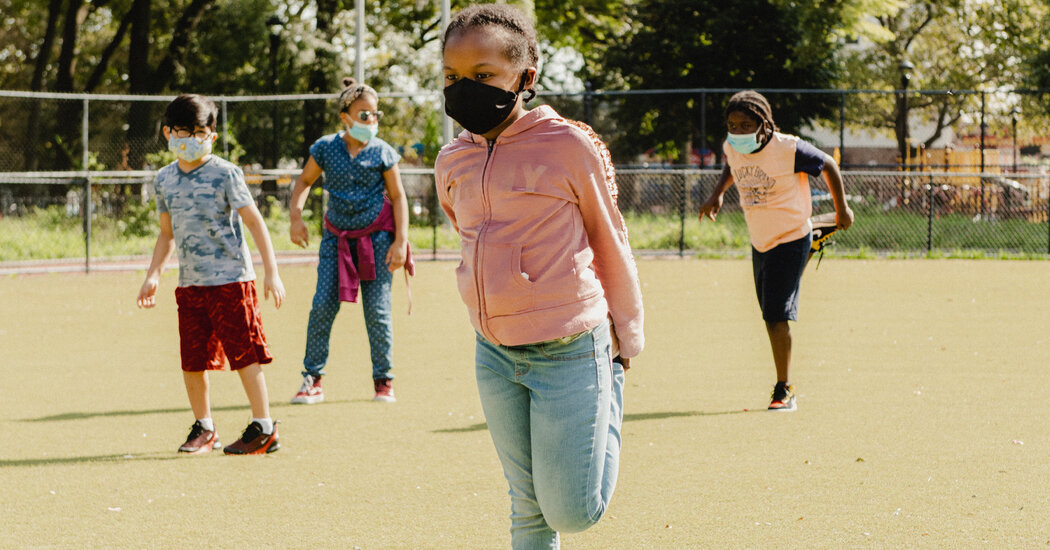Actually, Wearing a Mask Can Help Your Child Learn
Opponents of mask mandates for preschool and elementary school children have expressed concern that wearing masks will impair children’s ability to learn language and socialize — or worse, that (in the words of one anxious parent in Utah) it will “rewire their brains.” Even parents who support mask mandates often worry about how a school year without smiles and frowns might negatively affect their children.These concerns are understandable but unwarranted. Although scientists don’t have much data yet on how wearing masks during a pandemic affects children’s development, there is plenty of reason to believe that it won’t cause any harm. Children in cultures where caregivers and educators wear head-coverings that obscure their mouths and noses develop skills just as children in other cultures do. Even congenitally blind children — who cannot see faces at all — still learn to speak, read and get along with other people.Indeed, there is good reason to believe that wearing a mask at school could actually improve certain social and cognitive skills, helping to strengthen abilities like self-control and attention. This is not to say that masks are preferable to no masks, all things being equal. Masks are inconvenient, uncomfortable and bothersome. But as long as they are needed, we should take advantage of the fact that they offer distinctive opportunities for learning and growth.Take language learning. It’s true that masks cover our mouths and that seeing mouth shape and movement contributes to language development in infants. But learning how to communicate verbally involves a lot more than mouths — a reality that masks accentuate. It turns out that looking at eyes is at least as important as looking at mouths to understand whom you are looking at and what they are trying to convey. Eye-tracking research shows that by age 2, typically developing children spend more than twice as much of their time looking at adult speakers’ eyes than at their mouths. In fact, children with a stronger capacity to discern people’s thoughts and emotions based on their eyes alone exhibit greater social-emotional intelligence.Children also rely on other cues, such as prosody, gesture and context, to figure out what new words mean and what other people are thinking. Sometimes these cues are subtle. A classroom full of people wearing masks is a great opportunity for children to practice paying attention to those cues, such as a peer’s tone of voice or a teacher’s body language.Wearing a mask can also help teach children to pay more attention to their own bodies and physical behaviors. Keeping a mask on over the course of a school day involves the kind of self-control and self-regulation that many children find challenging. Younger children must inhibit the urge to pull off their mask, and older children must be mindful of when their mask is slipping down or when it’s OK to take it off.Needless to say, children will not always be perfect at keeping their masks on. But the research on self-control and self-regulation suggests that children who master the skills needed to keep their masks on will grow up to be better at achieving their long-term goals, solving problems and handling stressful situations. (For children who habitually bite their nails or pick their nose, a mask could also be precisely what they need to kick the habit.)Perhaps most important, wearing masks during a pandemic is an opportunity for even young children to practice caring for their community. By preschool, children can understand that invisible “germs” can cause illness and that behaviors such as hand-washing can keep germs from spreading. A recent study shows that children living through the Covid-19 pandemic understand illness transmission better than ever. During a time of anxiety and uncertainty, wearing a mask gives young children the ability to do something to help protect other people.For older children, mask wearing is a way to teach more sophisticated ethical concepts like duty and sacrifice. By age 7, for example, children believe that it feels good to make sacrifices on behalf of others in need. Stressing that the discomfort and inconvenience of mask wearing are forms of generosity and public service might motivate children to address other social problems in their lives, like bullying.Ultimately, how children feel about wearing masks at school, and how much they psychologically benefit from wearing them, is going to depend on how the parents, teachers and caregivers around them present the issue. Masks are hopefully not here to stay, but while they are still necessary, we should make the most of them.Judith Danovitch (@JudithDanovitch) is an associate professor of psychological and brain sciences at the University of Louisville and a Learning Sciences Exchange fellow at New America.The Times is committed to publishing a diversity of letters to the editor. We’d like to hear what you think about this or any of our articles. Here are some tips. And here’s our email: [email protected] The New York Times Opinion section on Facebook, Twitter (@NYTopinion) and Instagram.

